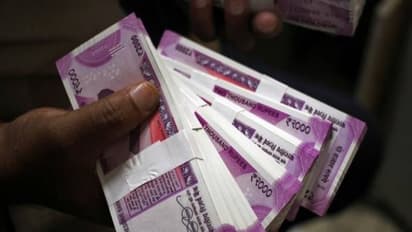PM Modi always believed Rs 2000 notes are not practical currency, says former principal secretary Misra

Synopsis
Former principal secretary to Prime Minister Narendra Modi, Nripendra Misra, who was in the thick of things during November 2016 demonetisation, said PM Modi always believed that the Rs 2000 notes are not practical currency for the day to day transactions.
Former principal secretary to Prime Minister Narendra Modi, Nripendra Misra, hailed the Reserve Bank of India's move to recall the Rs 2,000 currency notes from circulation. Misra, who was in the thick of things during November 2016 demonetisation, said PM Modi always believed that the Rs 2000 notes are not practical currency for the day to day transactions.
“Honourable PM always believed that the Rs 2000 notes are not practical currency for the day to day transactions. Moreover, it facilitates generation of Black Money and practice of tax evasion. He always considered lower denomination as a currency of the masses," Misra said.
Also Read | RBI asks banks to stop issuing Rs 2,000 notes with immediate effect; check details
He further added, "The withdrawal of Rs 2000 notes confirms the modular building approach of the Hon. Prime Minister. It began with the stoppage of printing Rs 2000 notes, followed by gradual withdrawal from circulation and now complete stoppage on September 30, 2023. It has nothing to do with the misplaced rumours of demonetisation.”
In an announcement on May 19, the RBI said that it was taking the Rs 2,000 notes out of circulation after conducting a review. The central bank did emphasise that the banknotes will still be accepted as legal money.
The RBI notified the removal of the notes on Friday evening, citing the "clean note" policy, which stipulates that larger denomination bills have a four- to five-year shelf life. It followed that the notes would eventually be phased out.
Misra served as Prime Minister Modi's principal secretary from 2014 until 2019. In an effort to combat black money and fake Indian currency notes, the Centre stated in November 2016 that the Rs 1,000 and Rs 500 (old series) notes will no longer be accepted as legal cash.
Stay updated with the Breaking News Today and Latest News from across India and around the world. Get real-time updates, in-depth analysis, and comprehensive coverage of India News, World News, Indian Defence News, Kerala News, and Karnataka News. From politics to current affairs, follow every major story as it unfolds. Get real-time updates from IMD on major cities weather forecasts, including Rain alerts, Cyclone warnings, and temperature trends. Download the Asianet News Official App from the Android Play Store and iPhone App Store for accurate and timely news updates anytime, anywhere.